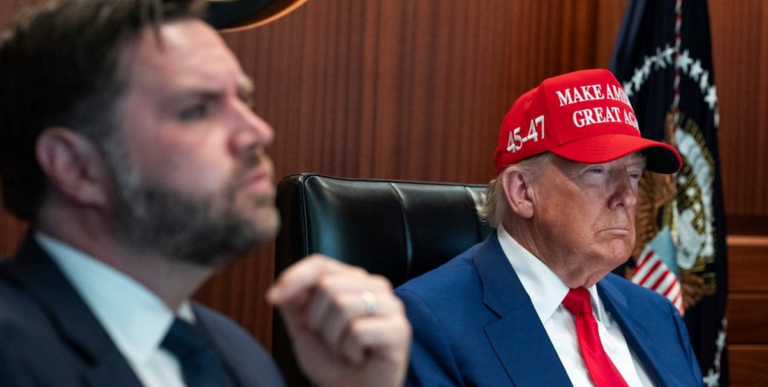
U.S. reverses diplomatic stance, backs strikes on Iran despite international law violations and regional escalation risks
New York, N.Y. – President Donald Trump’s abrupt pivot from diplomacy to military force in backing Israel’s campaign against Iran has ignited worldwide condemnation and exposed deep fractures within his administration and geopolitical order.
The shift, detailed in a Tasnim News Agency investigation and corroborated by U.S. officials, reveals Trump yielded to intense pressure from Israeli Prime Minister Benjamin Netanyahu despite earlier commitments to negotiate with Tehran.
On June 8, after Netanyahu threatened unilateral action, Trump greenlit U.S. support for strikes that commenced June 13—targeting not only nuclear sites but civilian infrastructure in what Professor Scott Lucas termed “Phase One” of a broader offensive.
U.S. Policy Reversal: Diplomacy to “Bunker Busters”
Trump’s reversal followed months of secret military preparations. By mid-May, the Pentagon diverted weapons shipments originally earmarked for Ukraine to the Middle East and drafted contingency plans for joint operations with Israel, anticipating strikes on Iran’s nuclear facilities.
Though Trump initially positioned himself as a peacemaker—dispatching envoy Steve Witkoff for talks—he faced relentless pressure from pro-Israel allies like Senator Lindsey Graham and broadcaster Mark Levin, who framed Iran’s nuclear program as an existential threat.
The culmination arrived on June 21, when U.S. B-2 stealth bombers dropped 30,000-pound bunker-buster bombs on Iran’s Fordow, Natanz, and Isfahan nuclear sites. Trump hailed the operation as “HISTORIC,” claiming facilities were “completely and fully obliterated” despite no independent verification.
Vice President J.D. Vance later framed the attack as a
“reset,” urging Iran to “go down the path of peace.”
International Outcry and Legal Challenges
Russia’s Foreign Ministry condemned the strikes as a “blatant violation of international law” and the U.N. Charter, demanding an immediate halt to aggression 1. Spain’s Foreign Minister José Manuel Albares Bueno countered the military approach: “It is not a military solution that will bring peace… but diplomacy.”
Iran has called for an emergency U.N. Security Council meeting, with Ambassador Amir Saeid Iravani accusing the U.S. of “illegal use of force” 7. Meanwhile, Tehran’s Foreign Minister Abbas Araqchi declared the U.S. and Israel had “blown up the negotiating table,” dismissing European pleas for renewed talks.
Domestically, Senator Tim Kaine (D-VA) slammed Trump for bypassing Congress: “The Constitution is completely clear on it… This is the U.S. jumping into a war of choice.”
Escalating Conflict and Regional Fallout
Israel’s campaign, dubbed Operation Rising Lion, expanded beyond nuclear sites to include missile command centers and Revolutionary Guard bases, killing at least three guardsmen in Zanjan province 412. Iran retaliated with Kheibarshekan ballistic missiles—featuring multiple warheads—and drones targeting Israeli infrastructure 26.
Simultaneously, cyber warfare intensified. The hacktivist group CyberIsnaadFront crippled Israel’s military-industrial complex, disrupting arms producer RAFAEL and causing systemic failures in missile systems 68.
Civilian tolls mounted on both sides: In Tehran, 13-year-old Parnia Rahmanian lay comatose after a strike 7, while Israel ordered nationwide airspace closures. Thousands fled Iran’s capital after Israeli evacuation warnings, with one refugee noting, “Tehran is empty.”
Strategic Dilemmas and “Plausible Deniability”

Behind Trump’s embrace of Netanyahu’s agenda lies a calculated strategy of plausible deniability.
While Trump publicly distanced the U.S. from Israel’s initial June 13 strikes—with Secretary of State Marco Rubio calling them “unilateral”—he privately authorized intelligence and hardware support.
Similarly, Trump floated the idea of relocating Gaza’s population as a “brilliant” plan, which Netanyahu later adopted as official policy, letting the U.S. avoid direct endorsement of what critics label ethnic cleansing.
Netanyahu’s gamble hinges on degrading Iran’s capabilities before diplomatic constraints tighten.
Yet experts warn the campaign could backfire: U.S. intelligence assesses the strikes set back Iran’s nuclear program only “by months,” while Barbara Leaf, former U.S. assistant secretary of state, cautioned that threatening the regime’s survival could trigger all-out retaliation.
As Iran vows “everlasting consequences,” the U.S. has ordered non-essential staff out of Lebanon, bracing for blowback.
With Russia hosting Iran’s foreign minister and the OIC convening emergency talks, the crisis tests a fractured world order—and Trump’s claim that his legacy would be that of a “peacemaker.”